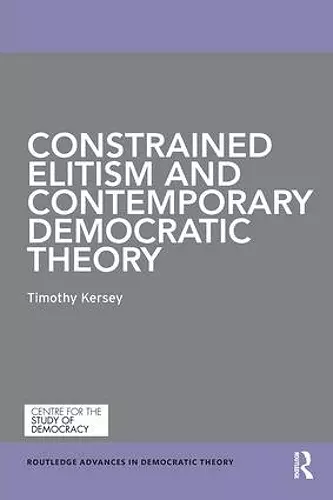Constrained Elitism and Contemporary Democratic Theory
Format:Paperback
Publisher:Taylor & Francis Ltd
Published:24th Jan '18
Currently unavailable, and unfortunately no date known when it will be back
This paperback is available in another edition too:
- Hardback£150.00(9780415727129)

Today, examples of the public’s engagement with political issues through commercial and communicative mechanisms have become increasingly common. In February 2012, the Susan G. Komen Foundation reversed a decision to cease funding of cancer screening programs through Planned Parenthood amidst massive public disapproval. The same year, restaurant chain Chic-fil-A became embroiled in a massive public debate over statements its President made regarding same-sex marriage. What exactly is going on in such public engagement, and how does this relate to existing ideas regarding the public sphere and political participation? Is the public becoming increasingly vocal in its complaints? Or are new relationships between the public and economic and political leaders emerging?
Timothy Kersey’s book asserts that the widespread utilization of internet communications technologies, especially social media applications, has brought forth a variety of new communicative behaviors and relationships within liberal polities. Through quick and seemingly chaotic streams of networked communication, the actions of these elites are subject to increasingly intense scrutiny and short-term pressure to ameliorate or at least address the concerns of segments of the population. By examining these new patterns of behavior among both elites and the general public, Kersey unearths the implications of these patterns for contemporary democratic theory, and argues that contemporary conceptualizations of "the public’" need to be modified to more accurately reflect practices of online communication and participation.
By engaging with this topical issue, Kersey is able to closely examine the self-organization of both elite and non-elite segments of the population within the realm of networked communication, and the relations and interactions between these segments. His book combines perspectives from political theory and communication studies and so will be widely relevant across both disciplines.
'There is no shortage of talk about the impact of the internet on democracy. Yet very little of this debate has seriously engaged with contemporary democratic theory. By developing an original theoretical framework for understanding new forms of communication and public participation, this book brings together previously insular perspectives in a way that both political theorists and communication scholars should welcome.' - Kari Karppinen, University of Helsinki, Finland
'Constrained Elitism makes a valuable contribution to the conceptualization of the liberal public sphere in relation to contemporary communicative practices. It offers a considered, informative, and persuasive account of how today’s networked communications are helping to shape relationships between and amongst elites and non-elites within liberal democratic political systems. The central contribution of the book is to provide a general model of how networked communications are on the one hand enhancing the self-organizational capacity of publics, with the effect of increasing the pressure on elites by non-elite groups to address the latter’s concerns, and on the other hand providing a means for advancing the competitive advantage of particular elites.' -Lincoln Dahlberg, University of Queensland, Australia
ISBN: 9781138486430
Dimensions: unknown
Weight: 204g
136 pages